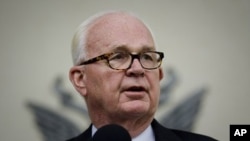The State Department said Tuesday U.S. and North Korean officials narrowed their differences on resuming Chinese-sponsored six-party negotiations on Pyongyang’s nuclear program in a two-day set of talks in Geneva. But, U.S. officials say there were no breakthroughs and that the process will take some time.
Officials are expressing cautious optimism about the results of the Geneva meetings, but say it could take months to find out if North Korea is willing to take the “concrete” steps needed to re-start the nuclear talks.
In the latest sign of an improved atmosphere between North Korea and other parties in the stalled six-way negotiations, senior U.S. and North Korean diplomats met behind closed doors for two days of meetings in Geneva.
U.S. special envoy for North Korea Stephen Bosworth said the sides narrowed some differences and that the tone was positive and generally constructive.
His North Korean counterpart, Vice Foreign Minister Kim Kye Gwan sounded more upbeat, citing “big improvements” in some areas and saying remaining differences will be solved when the sides meet again.
Briefing reporters, State Department Spokeswoman Victoria Nuland said there were no breakthroughs and that it might take some time to learn if North Korea is prepared to do what is needed to revive the six-party talks.
“We’ve narrowed the differences but there is quite a bit of work still to do," she said. "I think you know where we have been on the six-party talks. First, that the north-south dialogue needs to continue and second that we need to see real concrete steps, concrete commitments by the North Koreans on their nuclear obligations.”
A senior U.S. official said the North Korean team was given detailed proposals to take back to the leadership in Pyongyang and that given its track record on such issues, it will probably be a matter of weeks if not months before a decision is made.
North Korea agreed in principle in 2005 to scrap its nuclear program including a presumed small stockpile of weapons in return for aid and diplomatic incentives from other members of the six-party talks-Japan, Russia, South Korea, the United States and host China.
But Pyongyang walked out of the talks in 2009 and later conducted a second nuclear test.
North-South Korean relations went into a tail-spin last year with the sinking of a South Korean navy ship blamed on the north and the North Korean shelling of a southern coastal island.
John Park, senior program officer for Northeast Asia of the U.S. Institute of Peace, the USIP, says efforts to get North Korea back into the negotiating process are aimed in part at preventing a return to aggressive behavior by Pyongyang.
“One of the big motivations now is to try to engage North Korea in some kind of talks as a way to prevent future provocations," he said. "That thesis, I think, is being implemented right now to a certain degree. Certainly there are other factors involved as well. But in terms of taking a pro-active stance in terms of trying to prevent a recurrence of provocation like last year, this type of negotiating or engaging with North Korea is seen as an important element of that.”
The USIP’s Park says North Korea is being heavily “courted” amid a sense of urgency by China and others that the longer the six-party process is stalemated, the less chance there is of getting it going again.
U.S. spokeswoman Nuland said the Geneva meetings included North Korea’s request for international food aid to cope with shortages attributed to floods and mismanagement.
She said whether the United States, the largest single food donor to North Korea since the 1990s, provides new aid depends on a U.S. needs assessment and competing demand for famine relief elsewhere including the Horn of Africa.
Nuland said Washington also wants terms assuring that any aid reaches North Koreans truly in need, and she dismissed charges by some aid groups that a U.S. decision is being held up for political reasons.
“We reject those assertions. We do not connect these issues," she said. "And were we to go forward, we would have to have significant and detailed discussions about monitoring, which we have not yet had.”
Nuland said U.S. North Korea envoy Bosworth will step down and return full-time to his academic post at Tufts University near Boston after returning to Washington and briefing administration officials on the Geneva meetings.
Bosworth was accompanied there by veteran diplomat Glyn Davies, outgoing U.S. ambassador to the International Atomic Energy Agency, who has been named to the North Korea post.




